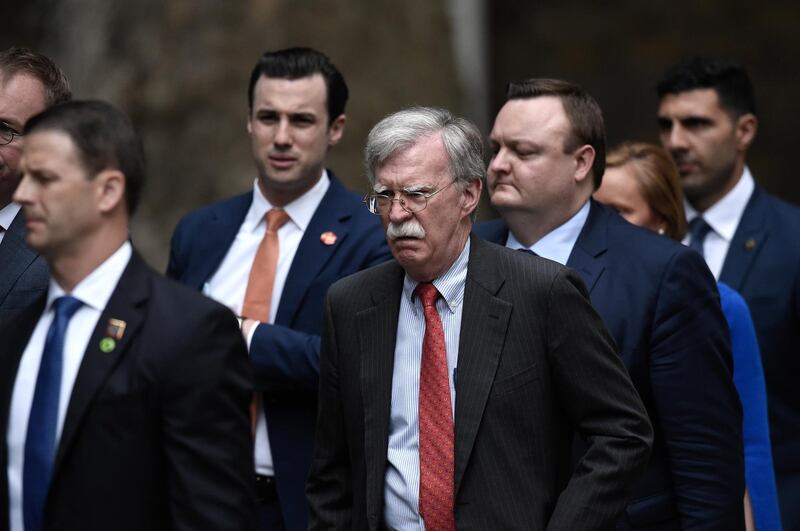While most of the attention concerning US President Donald Trump's state visit to Britain this week focused on the enduring strength of US-UK relations, the presence of his top national security team in London provided a valuable opportunity to seek clarification on Washington's latest thinking regarding a number of vital global security issues.
And perhaps the most revealing comments to emerge, so far as the Middle East region is concerned, were the insights I was able to glean during my interview in London with John Bolton, the US national security adviser, on the Trump administration’s policy towards Iran.
Tensions between Washington and Tehran have risen considerably in recent weeks with the US accusing Iran of planning attacks against the US and its allies. The Iranians are said to be seeking ways to retaliate for the Trump administration’s decision to withdraw from the 2015 nuclear deal and impose hard-hitting sanctions against the regime.
The sanctions have had a disastrous impact on the Iranian economy, and senior figures in Iran's security establishment are said to be keen to retaliate. US intelligence officials have blamed Iran for the recent sabotage attacks against four oil tankers moored off the coast of Fujairah, as well as a drone strike on a pipeline in Saudi Arabia's eastern province, and a rocket attack said to have been aimed at the US Embassy in Baghdad.
Mr Bolton has now promised to provide the UN with evidence of Iranian involvement in the attacks.
Moreover, acting on intelligence reports that Iran was planning further attacks in the Strait of Hormuz and other vital shipping lanes in the region, the US has deployed an aircraft carrier battle group, four B-52 bombers and 1,500 extra troops.
“Under the Obama administration, Iran felt they had us in their pockets, so the Iranians did not fear us anymore,” Mr Bolton told me. “Now they need to worry that if they do something they will pay a price.”
Mr Bolton spoke to me shortly after travelling to London from Abu Dhabi, where he met with Mohammed bin Zayed, Crown Prince of Abu Dhabi and Deputy Supreme Commander of the Armed Forces, for lengthy discussions on a number of regional security issues, including Iran.
“The president has made it clear that we are ready to negotiate on the nuclear issue,” Mr Bolton explained. “But we are not going to accept Iranian threats to restrict access in the Strait of Hormuz, or that threaten our allies’ interests.
"That is why we took the military steps we did – not because we want conflict, but precisely because we want to avoid it. We want to create the structures of deterrence that will convince Iran that this would be a dangerous course for them to pursue. It would be a very foolish mistake for Iran to doubt our resolve."
As someone who is credited in Washington with being the architect of the Trump administration’s robust stance on Iran, Mr Bolton is dismissive of European claims that the sanctions will fail to meet their objectives.
“Everyone said the sanctions would not work, but we have demonstrated we can do this on our own,” he said. “Regime change is not the president’s policy. We want to negotiate a new deal.
“The sanctions are working. The Iranian economy is close to collapse. Countries have a choice: “Would you rather do business with Iran or the US?” And they have chosen the US.
“The sanctions are having a very big impact on Iran’s ability to finance the Revolutionary Guard and other terrorist groups. We do not want a war with Iran. But if you look at the central cause of trouble in the Middle East today, it is Iran.”
President Trump later backed up Mr Bolton’s warnings during his state visit to Britain when he said there was “always a chance” the US could launch military action against Iran, even though his administration’s preferred option was for a negotiated settlement.
Mr Bolton is also frustrated with the attitude of many European states – including Britain – over their approach to the Iran issue, where they have refused to back Washington’s policy, and have instead reiterated their commitment to the 2015 deal.
As US and European leaders gathered to mark the 75th anniversary of the D-Day landings in Normandy, the audacious military operation that ultimately led to the defeat of Nazi Germany, Mr Bolton called for greater co-operation between western democracies in order to demonstrate the same level of resolve to counter future threats.
“It is a mistake to say we passed the end of history as some people said at the end of the Cold War,” Mr Bolton told me. “We hoped it might be the case, but it turned out not to be true, and we have to acknowledge the real world that we live in.
“The best way to protect our common values is to make sure that we are prepared to resist challenges. This is what Ronald Reagan called ‘peace through strength’. And if people are prepared to live up to that, then we should be united going forward.”
Unsurprisingly, Mr Bolton’s robust approach to Iran and other high-priority national security issues, such as China and North Korea, has made him many enemies. In Washington there are constant media reports that he is about to be sacked, while senior government ministers in Tehran have resorted to personal abuse.
In one of the more colourful interventions, Ayatollah Ali Khamenei, Iran’s supreme leader, accused Mr Bolton of suffering from “chronic hallucinatory psychosis”.
But Mr Bolton said he is unfazed by such attempts to diminish his credibility.
“Iran believes that if it attacks the president’s advisers, then somehow it will split the president away. It is just a propaganda campaign.
“I like that old Central Asian saying, ‘The dogs bark, and the caravan moves on’,” he concluded. “I don’t care what they say.”
Con Coughlin is the Daily Telegraph’s defence and foreign affairs editor





